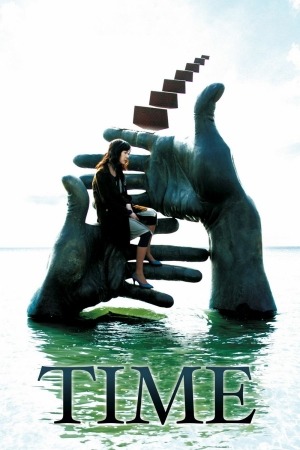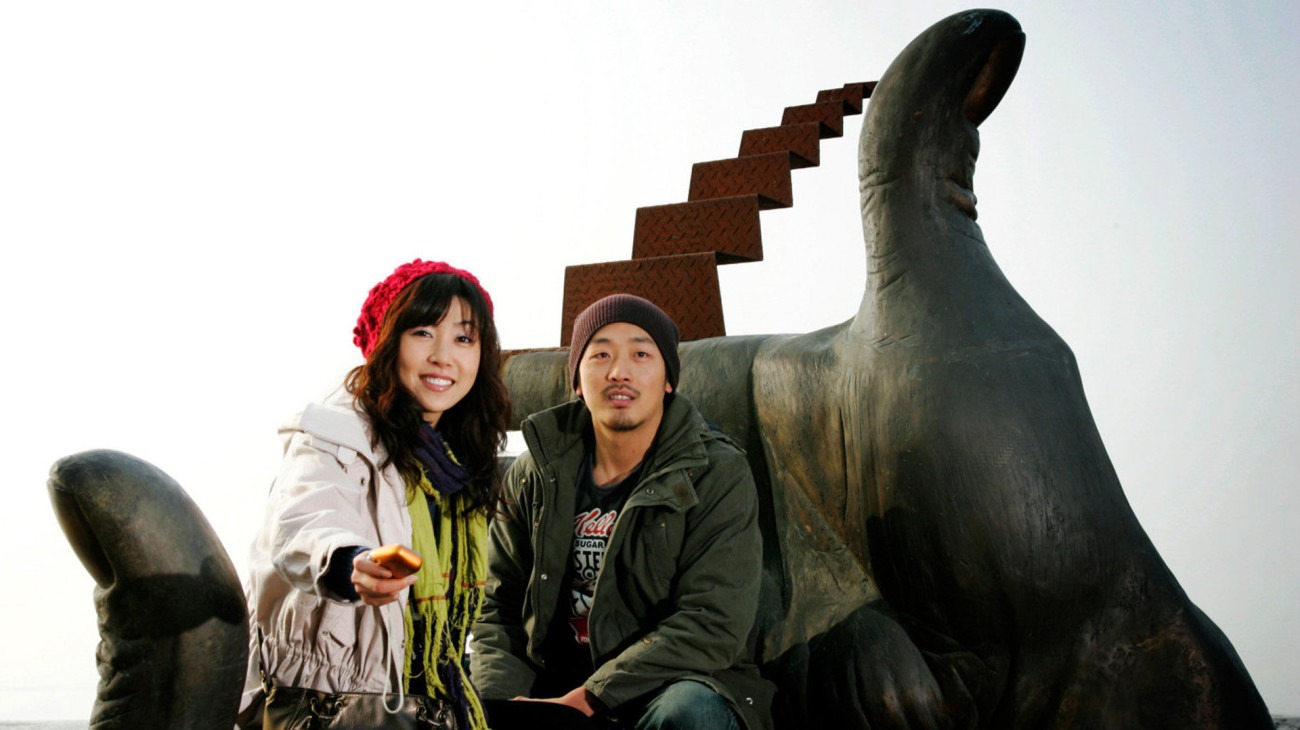
The 42nd Chicago International Film Festival
I have not seen nearly as much of the work of director Kim Ki-duk as I would like, and what I have seen, though brilliant, is not usually regarded as "typical." Therefore I don't know whether Time is more of a return to form, or a fall from grace; it is certainly not subtle in anyway, and considerably more aggressive in communicating its themes than e.g. Spring, Summer, Fall, Winter...and Spring. It does not, however, follow that the film is a failure, as I have heard some claim. Merely that it is only a very good film by a very good director, and not a flat-out masterpiece.
Seh-hee (Park Ji-yeon) is in love with Ji-woo (Ha Jung-woo). Unfortunately, Seh-hee is a little bit psychotic, and after two years of dating, she manages to convince herself that he is bored with her. And so she undergoes needless plastic surgery to gain a new identity, See-hee (Seong Hyeon-a), whereupon she seduces Ji-woo for the second time.
The bulk of the film is actually concerned with Ji-woo, and not with either incarnation of his girlfriend. For several months after Seh-hee's unexplained disappearance, he drifts around lonely and lost, taking solace only in the memory of the time they spent together. The story takes place across a very small number of locations, the two most important being the two where the lovers spent significant moments together: the coffee shop where they see each other for the last time, and a park full of sexual - but not necessarily erotic - statues. This last is the key to the film's depiction of obsession and loss: it is the site where a photo was taken of Ji-woo and Seh-hee (later recreated by Ji-woo and See-hee), and this photo looms as the primary sign of their lost time together.
It is not a realistic story by any stretch, but it is poetically true, and this is all that matters. It's much angrier than any other Kim film I have seen, shockingly so, but it tries and generally succeeds to get at the feelings of abandonment involved in the death of love. That this love has not died but rather mutated is not ignored, but it is not very important to the middle of the film, either.
As the title implies, Time is obsessively, perhaps overly concernced with the relationship of past, present and future, or more specifically Then and Now. Ji-woo is fixated on Then and returning to it, while Seh-hee is much more concerned with recognizing that Then is over and Now must be built, yet the very end (which at first seems profound, then cheap, then profound again) makes it clear that Then and Now are more or less the same thing: we perceive them as different, but our memories of Then occur in the Now, and combines the two times into one experience. This theme is largely expressed through the use of photographs, the Now captured for all time, so that even as a moment passes, the concrete evidence of it will always exist.
That was an annoying paragraph, and I apologise for not having a better way of phrasing it.
All this aside, it is undeniable that the film takes a turn for the disagreeably weird in its last third or so: not that it doesn't play by the rules it sets up, more that the characters become uninteresting freaks (at no point were they "sympathetic," but they become positively grating). At the screening I attended, most of the audience started laughing. Now, I think they started laughing when the film was still good, but it remains the case that some very silly developments occur, and to a more plot-minded individual than myself, that probably makes the film a failure.
No matter how good or bad the script and themes are, it's still a Kim Ki-duk film, and that means it has a fantastic visual sense. Spring, Summer, Etc. is still the touchstone for his visual language, but Time is hardly shabby: particuarly in the many scenes filmed in the sculpture park. It's not just that the images are lovely, although they are: they are the key signifier by which we understand the film's emotional arc. Loneliness is evoked through isolating characters in frames within the frame (in one striking scene, Ji-woo attempts to end his isolation by crossing out of a framing element, but the editing undoes his work), while love and connection are shown by placing characters together in a discrete field, most importantly the literal frame around the iconic photograph of Ji-woo and Seh-hee.
It speaks to the bigotry of high expectations that this film has received the amount of festival dismissal that I've observed. If we did not know what Kim Ki-duk was capable of, it would be much easier to regard this as a masterpiece. Now, even I will avoid that word, but just because it is a step down does not make it a failure or a disappointment. It is probably the best film about relationships I have seen this year.
8/10
Seh-hee (Park Ji-yeon) is in love with Ji-woo (Ha Jung-woo). Unfortunately, Seh-hee is a little bit psychotic, and after two years of dating, she manages to convince herself that he is bored with her. And so she undergoes needless plastic surgery to gain a new identity, See-hee (Seong Hyeon-a), whereupon she seduces Ji-woo for the second time.
The bulk of the film is actually concerned with Ji-woo, and not with either incarnation of his girlfriend. For several months after Seh-hee's unexplained disappearance, he drifts around lonely and lost, taking solace only in the memory of the time they spent together. The story takes place across a very small number of locations, the two most important being the two where the lovers spent significant moments together: the coffee shop where they see each other for the last time, and a park full of sexual - but not necessarily erotic - statues. This last is the key to the film's depiction of obsession and loss: it is the site where a photo was taken of Ji-woo and Seh-hee (later recreated by Ji-woo and See-hee), and this photo looms as the primary sign of their lost time together.
It is not a realistic story by any stretch, but it is poetically true, and this is all that matters. It's much angrier than any other Kim film I have seen, shockingly so, but it tries and generally succeeds to get at the feelings of abandonment involved in the death of love. That this love has not died but rather mutated is not ignored, but it is not very important to the middle of the film, either.
As the title implies, Time is obsessively, perhaps overly concernced with the relationship of past, present and future, or more specifically Then and Now. Ji-woo is fixated on Then and returning to it, while Seh-hee is much more concerned with recognizing that Then is over and Now must be built, yet the very end (which at first seems profound, then cheap, then profound again) makes it clear that Then and Now are more or less the same thing: we perceive them as different, but our memories of Then occur in the Now, and combines the two times into one experience. This theme is largely expressed through the use of photographs, the Now captured for all time, so that even as a moment passes, the concrete evidence of it will always exist.
That was an annoying paragraph, and I apologise for not having a better way of phrasing it.
All this aside, it is undeniable that the film takes a turn for the disagreeably weird in its last third or so: not that it doesn't play by the rules it sets up, more that the characters become uninteresting freaks (at no point were they "sympathetic," but they become positively grating). At the screening I attended, most of the audience started laughing. Now, I think they started laughing when the film was still good, but it remains the case that some very silly developments occur, and to a more plot-minded individual than myself, that probably makes the film a failure.
No matter how good or bad the script and themes are, it's still a Kim Ki-duk film, and that means it has a fantastic visual sense. Spring, Summer, Etc. is still the touchstone for his visual language, but Time is hardly shabby: particuarly in the many scenes filmed in the sculpture park. It's not just that the images are lovely, although they are: they are the key signifier by which we understand the film's emotional arc. Loneliness is evoked through isolating characters in frames within the frame (in one striking scene, Ji-woo attempts to end his isolation by crossing out of a framing element, but the editing undoes his work), while love and connection are shown by placing characters together in a discrete field, most importantly the literal frame around the iconic photograph of Ji-woo and Seh-hee.
It speaks to the bigotry of high expectations that this film has received the amount of festival dismissal that I've observed. If we did not know what Kim Ki-duk was capable of, it would be much easier to regard this as a masterpiece. Now, even I will avoid that word, but just because it is a step down does not make it a failure or a disappointment. It is probably the best film about relationships I have seen this year.
8/10






